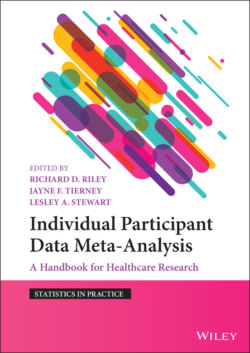Читать книгу Individual Participant Data Meta-Analysis - Группа авторов - Страница 71
4.2.2 Developing the Protocol for an IPD Meta‐Analysis Project
ОглавлениеAs for all research studies, a protocol is an invaluable tool for working through the design and guiding the conduct of an IPD meta‐analysis project. It serves not only to describe the planned methods in advance of data collection, but is also a main vehicle for communicating the rationale for the project, and convincing potential collaborators of the value of participation – reassuring them that the project is sensible and methodologically sound, and that their IPD will be used appropriately. However, if funders wish to receive or sign off a protocol before releasing project funds, for example, this can pose practical difficulties. A way around this may be to provide funders with a project scope (Section 3.3) or draft version of the protocol, and explain that it will be finalised after collaborators have had the opportunity to comment. This then allows the central research team to modify plans according to the feedback received, and describe which data the included trials have actually collected and will make available.
Figure 4.2 PICOS example: objective and eligibility criteria for an IPD meta‐analysis of pre‐operative chemotherapy for non‐small‐cell lung cancer.88
Source: Based on NSCLC Meta-Analysis Collaborative Group. Preoperative chemotherapy for non-small cell lung cancer: a systematic review and meta-analysis of individual participant data. Lancet 2014;383:1561–71.
Key sections to include in the project protocol are shown in Box 4.1. Although the structure is broadly similar to that for a conventional systematic review and meta‐analysis of existing aggregate data, greater attention should be paid to explaining the rationale for seeking IPD, describing how data will be checked and used, and, in particular, detailing the analyses that will be performed. The latter is particularly important, because IPD offer greater analytical breadth, flexibility and complexity, thereby introducing more potential for inappropriate analyses, and also more opportunity for ‘data dredging’, data manipulation or the selection of analyses that will generate particular findings, or support prior beliefs. Developing a detailed and publicly accessible protocol prior to receiving IPD helps safeguard against these practices, and at the same time counters any unfounded suspicion or allegations of such manipulation. At a minimum, this would include the main and additional outcomes, and their definitions; methods of individual trial analysis (if relevant) and meta‐analysis, including those for exploring potential effect modifiers at the trial or participant level; and methods for quantifying and accounting for heterogeneity.
